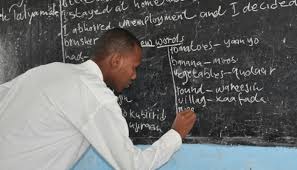EDUCATION

WORLD TEACHERS’ DAY: NIGERIAN TEACHERS DECRY POOR WELFARE, SAY ‘WE’RE UNDERVALUED AND FORGOTTEN’
Nigeria joined the rest of the world to celebrate World Teachers’ Day last week, but for many teachers across the country, the occasion was a painful reminder of neglect, poor welfare, and broken promises.
While the Federal Government pledged to improve the welfare and professional support of teachers, many educators say the reality tells a different story — one of frustration, low pay, and a lack of respect for the profession.
At a symposium in Abuja, Minister of Education, Maruf Olatunji Alausa, and Minister of State for Education, Prof Suwaiba Said Ahmad, reaffirmed the government’s commitment to supporting teachers under the global theme “Recasting Teaching as a Collaborative Profession.”
However, at various events held across the country, teachers’ unions and education stakeholders lamented that poor implementation of policies, low remuneration, and inadequate teaching facilities continue to cripple the education sector.
The National President of the Nigeria Union of Teachers (NUT), Comrade Audu Amba, urged both federal and state governments to take teachers’ welfare seriously, noting that “without deliberate investment in teachers, the future of education is at risk.”
“Governments must increase budgetary allocation to education and create a conducive learning atmosphere to ensure quality outcomes,” Amba said.
State governors also commended teachers for their hard work and commitment to shaping the next generation but were urged to move beyond praise to real action.
The National Association of Proprietors of Private Schools (NAPPS) also appealed for better support for private school teachers, calling for improved welfare, fair taxation, and access to loans for school owners.
However, for many teachers, the celebration felt hollow.
A chemistry and mathematics teacher, Michael Divine, said Nigerian teachers are “the most underrated professionals” in the country.
“In private schools, we’re treated like slaves. Some schools charge ₦200,000 in fees, yet the highest-paid teacher doesn’t earn ₦50,000. Our dignity is trampled on daily,” he said.
Another teacher, Victor Ngbede, shared similar frustrations, describing how poor salaries, intimidation from school owners, and disrespect from parents have made teaching a thankless job.
“Parents only show up to fight teachers, rarely to appreciate them,” he lamented.
Samson Igwe, another teacher, said the profession has become so undervalued that it affects teachers’ personal lives.
“Once people hear you’re a teacher, some families reject your marriage proposal. Society doesn’t respect us anymore,” he said, adding that even philanthropists ignore teachers when offering support.
Despite these challenges, Nigerian teachers remain resilient — moulding lives and shaping the nation’s future, even when their own welfare remains uncertain.
“We keep going because we know we’re shaping destinies,” Michael Divine said. “But truth be told, teachers deserve better.”
"This represents a significant development in our ongoing coverage of current events."— Editorial Board









